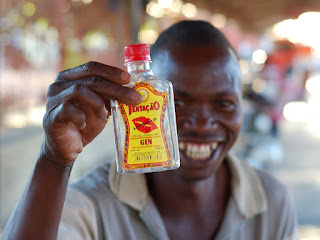The Battle for Mozambique's Soul: Flags, Streets, and Power
In a dramatic turn of events that has shaken Mozambique to its core, Venâncio Mondlane, from his exile abroad, has not only challenged the recent election results but is now proposing a radical overhaul of national symbols and governance.
Mondlane, who has stirred the largest political storm since Mozambique's first elections in 1994, took to a live broadcast on Facebook to unveil his vision for a new Mozambique. "Next year, we want a new flag in Mozambique, and in this new flag, the weapon must be removed," he declared, envisioning a nation where the "spirit of the people" isn't marred by symbols of conflict. By January 10, he promises an "open competition" for this new emblem, signaling a transformative moment in Mozambican identity.
But the changes don't stop at the flag. Mondlane is pushing for a complete revision of the Constitution, with plans for a draft presentation set for January 15. His agenda includes decentralizing power by letting communities elect their local leaders, from district heads to neighborhood watchdogs. "All institutions, from administrations to provincial governments, are suspended, and the people will choose their true leaders," he boldly stated, envisioning a Mozambique where governance is truly by the people, for the people.
The streets of Mozambique have turned into battlegrounds since Mondlane's challenge to the election results, where Daniel Chapo of the ruling Frelimo party was declared president with a 65.17% victory. The protests, fueled by Mondlane's supporters who claim a 24% share of the votes, have led to chaos, with barricades, looting, and deadly clashes with police, resulting in nearly 300 deaths since October 21.
In this turmoil, Mondlane isn't just stirring the pot; he's proposing to rename avenues in Maputo, moving away from names like Kim Il-Sung and Mao Zedong to those that resonate more with Mozambican history and culture. Names like Samora Machel, the country's first President, or the late activist Alice Mabota, could soon grace the city's thoroughfares if Mondlane has his way.
Amidst the tension, he's considering a "five-day tolerance" period to allow international humanitarian and investigative teams into Mozambique, seeking to shed light on alleged human rights abuses. Meanwhile, former Southern African Presidents are stepping in, offering to mediate what has become a deeply polarized situation, with Mondlane accusing Frelimo of shirking dialogue.
As Mozambique stands at this crossroads, the proposals from Mondlane paint a picture of a nation potentially reborn from the ashes of conflict, aiming for peace, identity, and true democracy. But with the streets still simmering and a government hanging onto power, the question remains: Will Mozambique embrace this vision or resist the winds of change?

Comments
Post a Comment
What do you think 🤔?